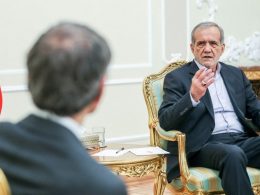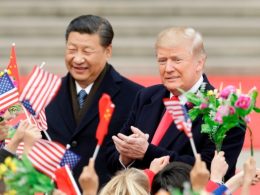Unlock the White House Watch newsletter for free
Your guide to what the 2024 US election means for Washington and the world
What do you do about a problem with no solution, when any attempt to solve it would almost certainly lead to world war three? The problem is Taiwan and the answer given by Kerry Brown, one of Britain’s leading experts on the issue, is that we must preserve the stalemate that has prevailed for the past 76 years. The book’s final sentence sums up his argument: “Anything else is insanity.”
For as long as the view of the issue held on either side of the Taiwan Strait continues its current wide divergence, this is surely correct. While in 1972 it could be said in the communiqué that marked President Richard Nixon’s visit to the ailing Chairman Mao Zedong that “The United States acknowledges that all Chinese on either side of the Taiwan Strait maintain there is but one China and that Taiwan is part of China”, this is plainly no longer true.
A large majority of the 23.5mn residents of what for three decades has been a flourishing democracy say they are Taiwanese, not Chinese, and that they have no desire for unification. Perhaps the richest part of The Taiwan Story (published in the US this month as Why Taiwan Matters) is where Brown, who is professor of Chinese studies at King’s College London but began his career as a British diplomat in Beijing, takes the surprisingly rare step of exploring how Taiwanese thinking about their predicament has evolved as generations have changed.
Moreover, this evolution of public opinion since the occupation of Taiwan by Chiang Kai-shek’s defeated Kuomintang nationalists in 1949 and their imposition of an often harsh dictatorship until Chiang’s son laid the path for democracy four decades later, needs to be placed in the context of the island’s longer history. Contrary to the official Chinese line, Taiwan has not “been an inalienable part of China’s territory since ancient times”.
Taiwan became controlled by Imperial China for the first time in 1683, and so was formally “Chinese” only for 200 years until it was ceded to Japan in the Treaty of Shimonoseki in 1895. Previously, the island had seen itself as autonomous and been regarded from the mainland too as a somewhat wild place. In that sense, a reasonable analogy is the relationship between Ireland and England, although England controlled Ireland for rather longer than China has ever controlled Taiwan.
Brown is also, however, rightly cognisant of how China’s own thinking has evolved. Where Mao in 1972 could tell Nixon that China “can wait, maybe even 100 years” for unification, that certainly would not be said now by President Xi Jinping, who has spoken of how this issue “should not be passed down generation after generation”. As China has become stronger economically and militarily, so its leaders have come to express more impatience, backed now by credibility.
Recognising these contrasting but strongly held feelings on either side of the Strait, Brown concludes that there is simply no room for compromise as things stand. His biggest worry, in fact, is not that either China or Taiwan will seek to force the issue, but that the vagaries of domestic American politics might do so, with some new future president (which he carefully invents as a post-Trump ignoramus) deciding to teach China a lesson by suddenly recognising Taiwan as a sovereign state, thereby forcing Xi, or whoever is in power at the time, to fight or face humiliation.
Any war over Taiwan could quickly escalate into a global, potentially nuclear conflict, the risking of which can validly be counted as “insanity”. The main difficulty with Brown’s preferred diplomatic way of preventing war is that he wants America to return to its long-standing “strategic ambiguity” over whether it would intervene militarily to protect Taiwan. President Joe Biden chose to break from this in 2021-22 when he said, in effect, that while he was not willing to start world war three by fighting Russia directly in Ukraine, he would do so over Taiwan if China were to try to invade.
That threat was clearly intended to deter Xi from emulating President Vladimir Putin of Russia, which must mean Biden thought there was a real risk he might do so. We cannot know whether President Trump will maintain this threat. The difficulty is that finding ways to restore doubt over American willingness to intervene could risk encouraging an invasion. As Brown shows so compellingly, anyone who thinks the Taiwan problem can be easily solved probably hasn’t thought about it for long enough.
The Taiwan Story: How a Small Island Will Dictate the Global Future by Kerry Brown Viking £18.99/St Martin’s Press $30, 272 pages
Bill Emmott is a former editor of The Economist and author of ‘Deterrence, Diplomacy and the Risk of Conflict over Taiwan’ (IISS/Routledge 2024)
Join our online book group on Facebook at FT Books Café, and sign up to receive the FT Weekend newsletter every Saturday morning
Source link









